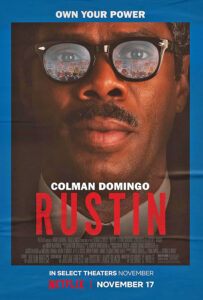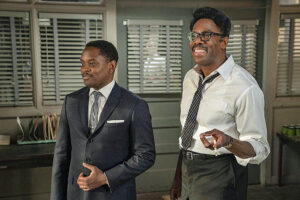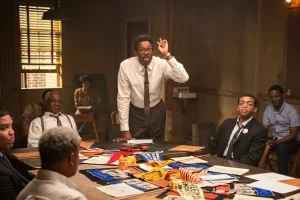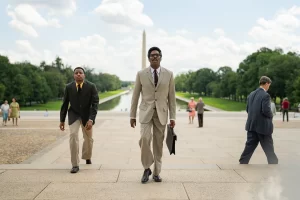 By Steve Crum
By Steve Crum
“It’s a rethinking of our history,” says Oscar nominated Colman Domingo about Rustin, the fascinating story of mostly unknown civil rights leader Bayard Rustin. In it, Domingo plays Rustin—terrifically so.
Directed by George C. Wolfe (Ma Rainey’s Black Bottom and numerous Broadway plays), Rustin opens in 1954, when segregation in the United States was ruled unconstitutional. Cue newsreel footage and the like, establishing the 20th Century historical setting and baseline for Julian Breece’s story and screenplay. (Credit also goes to Dustin Lance Black as screen scribe.)
 Cut to 1960, when Bayard Rustin was challenging Dr. Martin Luther King (Ami Amen) to lead a rights march at the Democrats’ convention in Los Angeles. It was the beginning of Rustin’s activism, as well as the first time MLK took a stance for non-violence. They butted philosophical heads. Rustin loses the round, and is demoted/fired for his extremism. His passion for activism, however, only increases. Rustin and King are still at odds when the former conceives of a gigantic civil rights march on Washington D. C.
Cut to 1960, when Bayard Rustin was challenging Dr. Martin Luther King (Ami Amen) to lead a rights march at the Democrats’ convention in Los Angeles. It was the beginning of Rustin’s activism, as well as the first time MLK took a stance for non-violence. They butted philosophical heads. Rustin loses the round, and is demoted/fired for his extremism. His passion for activism, however, only increases. Rustin and King are still at odds when the former conceives of a gigantic civil rights march on Washington D. C.
Despite the NAACP and other rights leaders talking Rustin’s plan down, Rustin doubles down on first convincing Dr. King that it would propel the civil rights  movement…peacefully.
movement…peacefully.
It is no spoiler to note that the Civil Rights March in August of 1963 was successful beyond expectations. Act 3 of Rustin focuses on the preparations for the immense undertaking. How would the expected 100 thousand attendees be transported to D. C.? Where would they be located in the area facing the Lincoln Memorial? What about security?
An excellent ensemble cast portrays civil rights leaders and activists. Among them are Chris Rock as Roy Wilkins, Glynn Truman (A. Phillip Randolph), Jeffrey Wright (Adam Clayton Powell Jr.), Maxwell Whittington-Cooper (John Lewis), Da’Vine Joy Randolph (Mahalia Jackson), and Carra Patterson (Coretta Scott King).
It is an awesome motion picture recreating an awesome time in our nation. Despite all the roadblocks (NAACP disagreement, persecution of Rustin’s gay private life), the various civil rights groups finally  got on board.
got on board.
By the way, as noted in Rustin, over 250 thousand people attended the event, hearing Dr. King’s “I Have a Dream” speech in person.
—————
GRADE on an A-F Scale: A
